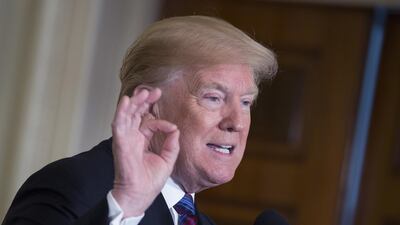The White House is postponing the Camp David summit from next month and until September, due to the continued stalemate in the Qatar dispute and a crowded foreign policy agenda for the US government.
Reuters, quoting five US officials on Tuesday, said that Washington has decided to postpone the summit with Gulf leaders (and possibly Egypt) from May until September, citing a busy calendar that includes negotiations with North Korea, and the fate of the Iran nuclear deal next month.
The delay is also attributed to the continued vacancy for a permanent secretary of state awaiting the Senate confirmation hearings for Mike Pompeo.
_______________
Read more:
Trump wants “to pull out” of Syria as US military increases presence in Manbij
_______________
While a US official told Reuters “this was entirely our [US] decision”, regional sources familiar with the negotiations told The National that a combination of reasons that include a continued stalemate with Qatar prompted the delay.
Those sources said that the Trump administration was informed directly last month that the resolution to the Qatar dispute which started last June must come from within the region (not in Camp David). Saudi foreign minister Adel Al Jubeir said as much ten days ago in Washington.
Mr Jubeir told The National at a press conference that if the US were to host a Camp David summit in May it would not be about Qatar. The dispute with Doha is an “inter-GCC problem”, he said.
A US delegation to the Gulf last month that included retired General Anthony Zinni and Tim Lenderking, deputy assistant secretary of state for Arabian Gulf affairs, failed to achieve a breakthrough. As the negotiations stalled, ideas were floated to have a counter-Iran summit or a a second counter violent extremism (CVE) summit as alternatives.
Those ideas were welcomed by all sides but stumbled with the busy foreign policy agenda for the White House in May as it prepares for a possible summit about North Korea and a negotiating deadline of May 12 for the Iran nuclear deal.
Separately, the White House announced that Mr Trump spoke on Monday with King Salman of Saudi Arabia where they discussed counter-Iran measures, the Israeli-Palestinian peace process, the Qatar dispute, Syria and the war in Yemen.
The White House said Mr Trump “expressed solidarity with Saudi Arabia following the Iranian Islamic Revolutionary Guard Corps (IRGC)-enabled Houthi ballistic missile attacks against civilian targets in Saudi Arabia on March 25.”
While emphasising the need “to counter Iranian malign influence and defeat terrorists and extremists” the “two leaders agreed on the significance of reinvigorating a political process to end the war in Yemen” the White House said.
On Syria, joint cooperation for “an enduring defeat of ISIL and counter Iranian efforts to exploit the Syrian conflict to pursue its destabilising regional ambitions” were discussed. Mr Trump called on Tuesday for more Saudi financial input to help stabilisation efforts in Syria and to keep US military presence in the country.
Also on Tuesday, Mr Trump spoke to the Emir of Qatar, Tamim bin Hamad Al Thani. “The president thanked the Emir for Qatar’s continued commitment to counter terrorist financing and extremism” the White House said. Iran’s behaviour – that the White House called reckless and destabilising – was also on the agenda.
On the Qatar dispute particularly, the White House said that Mr Trump “discussed the obstacles to restoring unity in the GCC.” The Qatari Emir was expected to visit Washington later this month.


